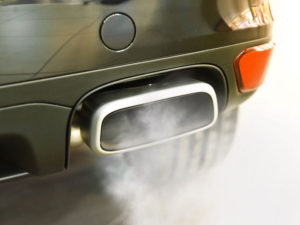Average CO2 emissions from new cars increases for third consecutive year
According to provisional data, published today by the European Environment Agency (EEA), average carbon dioxide (CO2) emissions from new passenger cars registered in the European Union (EU), Iceland, Norway and the United Kingdom (UK), increased in 2019.

About 38% of new car registrations were SUVs, which have been blamed by the EEA for the overall increase in CO2 emissions in 2019
The emissions rises marked the third consecutive year of increases in the region and comes despite an ever-increasing green agenda, electrified models arriving to market and governments and car makers all stating their intent to reduce emissions.
The message from the EEA is that zero- and low-emission vehicles must be deployed much faster across Europe to achieve the stricter targets that apply from 2020.
The rise has been partly blamed on the increase in popularity of SUVs, which now account for around 38% of all cars sold in the region, while offering reduced wind resistance and increased emissions and worse fuel economy when compared to a similar-sized hatchback.
The provisional data shows that new cars sold in 2019 emitted 122.4 grams of CO2 per km – up 1.6g/km on the previous year’s average.
Currently carmakers in the EU have to meet five-year emissions targets, with the last standard enforced back in 2015. This allows them to delay the roll-out of cleaner vehicles until the last minute, global green group Transport & Environment (T&E) said, and that during the planned review of CO2 targets in 2021, the EU should move to annual or bi-annual deadlines.
Julia Poliscanova, senior director for clean vehicles at T&E, said: “It’s a scandal that one year out from their CO2 target, carmakers are still pushing gas-guzzling SUVs. The EU must stop this maximising of profits at the cost of public health and the planet by bringing in annual or bi-annual emissions targets. That way carmakers will bring the zero-emissions cars they have developed to the forecourt quicker.”
Prior to 2017, there had been a steady decline in CO2 values from 2010 to 2016, by almost 22g/km CO2. According to the EEA’s provisional data, the upward trend continued with an increase of 1.6g CO2/km in 2019, reaching 122.4g/km CO2. This remains below the target of 130g/km CO2 that applied until 2019, but is well above the EU target of 95g/km CO2 that phases-in this year.
Almost 15.5 million new cars were registered in 2019 in the EU, Iceland, Norway and the UK, and while SUV adoption was vast, electric vehicle adoption was slow, the EEA added, to just 3.5% market penetration. 2018 saw 2% by comparison, while hybrids accounted for about 4% of the market.
Other reasons for the increase included the average weight of cars growing by 30kg from 2018-19 across all vehicle segments. In addition, 9 in 10 vans registered are still powered by diesel, the EEA noted, although the CV segment’s CO2 increase was just 0.5g/km and despite the average van weight increasing by 14kg in 2019.
Interestingly, diesel cars on average emitted 127.0g/km CO2, which compared to the petrol car average of 127.6g/km. The difference of 0.6g/km was the lowest observed since monitoring began, the EEA said.












